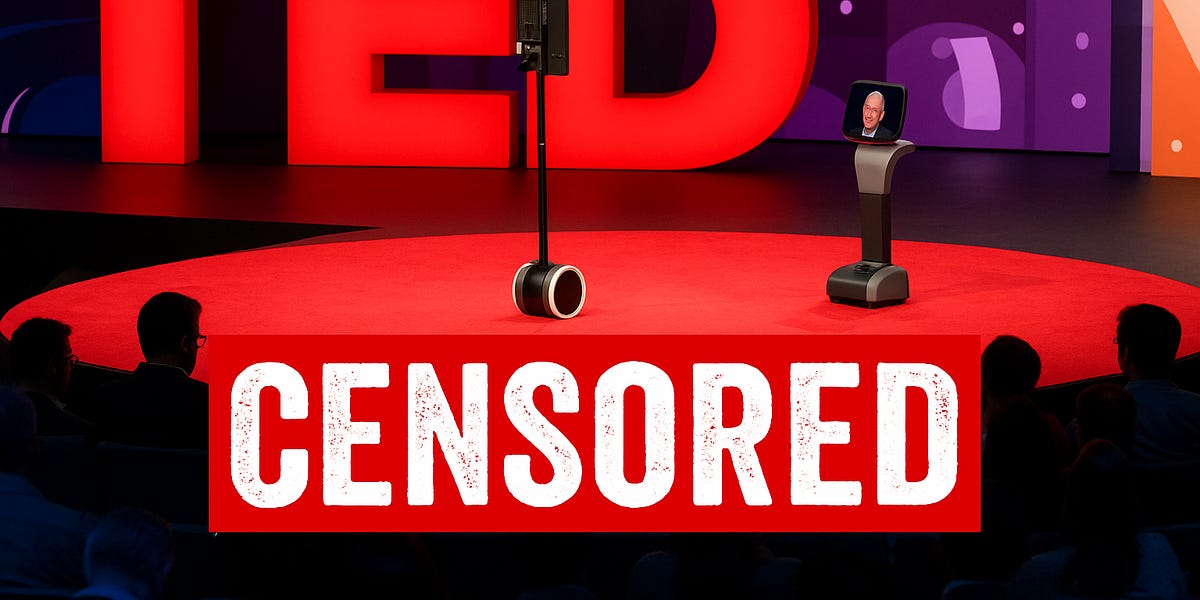Post it on Rumble where they support the free flow of ideas and free speech.But when the video was submitted to TED’s US headquarters for publication on the organisation’s official YouTube channel, it was rejected.
The reason? The talk “did not adhere to the TEDx content guidelines.”
A defence of dissent—silenced
Foster’s talk drew on the Covid-19 experience, arguing that during the pandemic, the space for critical thought collapsed. Dissenters were vilified and dialogue gave way to dogma.
She described how critics of mainstream Covid responses were smeared with labels—“a danger to public health… a tinfoil hat-wearing conspiracy theorist… probably a prepper or a cooker… almost surely a far-right extremist and probably racist to boot.”
Drawing comparisons with the Cultural Revolution and the rise of Nazi Germany, she warned that the marginalisation of dissent has deep historical roots—where enemies of the state are manufactured to maintain social control.
Foster recalled being labelled a “granny killer,” defamed online (despite never having a Twitter account), and receiving death threats for questioning lockdown policies.
“Well, I didn’t shut up,” she said. “And today, more than four years on… hundreds of books, academic papers, and tragic personal stories confirm I was right.”
“The lockdowns didn’t save lives. They were rather a massive human sacrifice induced by fear, politics, and money,” she added.
A bureaucracy that cannot handle dissent
By December 2024, with the video still unpublished, TEDxUNSW informed Foster that the US team had flagged her talk for further review.
She was asked to submit additional evidence to substantiate her claims—particularly those relating to lockdowns, mass vaccination, and censorship.
Foster complied, providing a detailed annotation backed by peer-reviewed studies, public health data, and academic commentary. But it wasn’t enough.
On 22 December, the local team relayed a list of statements TED deemed “potentially contentious,” including her description of lockdowns as a “massive human sacrifice,” her comparisons to authoritarian regimes, and her criticisms of public health leaders.
Despite acknowledging that her arguments were “compelling,” TEDx informed Foster on 21 March 2025 that the talk had been formally rejected—and could not be published on any platform.
“We were truly disappointed that TEDx did not approve your talk,” the organisers wrote to Foster, “especially given how insightful and important your message is.”
Surprised—particularly after months of collaboration—Foster asked for an official explanation. TED’s US office responded:
Foster pushed back, arguing that her talk aligned with TED’s stated mission to “spread ideas that spark conversation, deepen understanding, and drive meaningful change.”
She said the rejection misrepresented her content and stressed that her statements were “backed by studies of high intellectual and scientific rigour.”
She provided citations covering everything from censorship and vaccine mandates to excess deaths and lockdown impacts.
But TED never responded—and still refuses to publish the talk on its platform.
TED abandons its own mission
The implications extend far beyond one speaker or one talk.
TED, a platform that built its reputation on hosting challenging, uncomfortable—even radical—ideas, now appears unwilling to engage with narratives that challenge institutional power.
Foster’s talk was not incendiary. It was measured, historically grounded, and supported by evidence. But it questioned the public health consensus—and that, it seems, is now off-limits.
This isn’t just ironic; it’s an abandonment of TED’s own mission.
TED has previously published talks on alien intelligence, psychic phenomena, and utopian futures. Yet a sober, data-driven critique of pandemic policies by a respected economist? That, apparently, was too dangerous to air.
And TED is not alone. Across the digital landscape, we’re witnessing a broader pattern. Platforms once celebrated for fostering open dialogue are quietly narrowing the boundaries of acceptable thought.
Foster’s message was a warning—about how powerful institutions can manipulate public perception, weaponise fear, and suppress dissent, all while cloaking themselves in the language of public good.
She urged audiences to stay alert to manipulation disguised as altruism and to “celebrate forums at which people are allowed and encouraged to think, discuss, critically analyse, and ponder aloud.”
Instead, TED became the very thing she warned against: a gatekeeper of permissible opinion, enforcing orthodoxy behind the smokescreen of “community guidelines.”
For a platform that once prided itself on promoting bold thinking, TED’s censorship of Foster’s talk is a moment of institutional retreat—and intellectual cowardice.

When ideas become too dangerous to platform
TED, a platform that claims to champion bold ideas, has censored University Professor Gigi Foster, who spoke out in defense of free speech and the right to dissent.blog.maryannedemasi.com
of course ANY organization that operates long enough slides further and further left towards authoritarian oppression
You are using an out of date browser. It may not display this or other websites correctly.
You should upgrade or use an alternative browser.
You should upgrade or use an alternative browser.
Education Corruption, Malfeasance and Disinformation
- Thread starter GURPS
- Start date
'Breeding Ground for Virtue Signaling and Discrimination': Trump Squeezes Harvard -- Again
Harvard ignored the letter until yesterday, when Garber tried sweet-talking McMahon out of her decision to disqualify Harvard from any federal funding until they acted to end discrimination and anti-Semitic intimidation campaigns on campus. Garber tried to argue that he and McMahon were sympatico on those goals, but just differed on how to achieve them:
Harvard Researcher: Harvard Is Totally Corrupt
You cannot make this shite up ........
In more news from the vaunted Cathedral, yesterday the Times ran a remarkable story headlined, “Harvard Professor Who Studied Honesty Loses Tenure Amid Accusations of Falsifying Data.”

A professor studying honesty. What do you want to bet it was one of the contracts subject to Trump Administration review?
Oh, it gets so much worse. Harvard hasn’t stripped tenure from anyone for any reason since the 1940s. Not even former President Claudia Gay, who resigned in shame after being caught plagiarizing for her incomprehensible papers on structural racism. The last guy who got canned back in the ’40’s probably got caught endorsing President Eisenhower too loudly or something.
One suspects that Harvard’s historic and unprecedented disciplinary zeal — finally stripping tenure for the first time since before the moon landing — might just coincidentally align with the Trump Administration’s contract scalpel hovering over their $100 million federal pipeline. Funny how fast the gears of accountability grind into action when the checkbook’s in jeopardy. Harvard’s sudden rediscovery of consequences seems about as spontaneous as a North Korean election.
But you have to give “prominent behavioral scientist” Francesca Gino credit. If you’re going to manipulate data, at least do it on a study about manipulation. At least it’s thematic integrity.
I was most interested in the description of Ms. Gino’s field of study. She has published a number of peer-reviewed articles about “how small changes can influence behavior.” Behavior modification. The Times reported that “the studies in which Dr. Gino has been a co-author are, for example, included one showing that counting to 10 before deciding what to eat can lead to choosing healthier food.
In other words, she’s a nudger.
Nudging — the behavioral economics strategy of subtly guiding choices without the victims’ awareness — played a starring but curiously unexamined role during the pandemic. Born of the unholy conviction that small psychological tweaks — especially fear — can trigger massive shifts in behavior, nudges were deployed everywhere: floor arrows directing human traffic like livestock, automatic vaccine appointments, social norm messaging (“9 out of 10 people in your area wear their masks”), commercials featuring intubated children, and emotionally manipulative signage warning shoppers to save grandma from the ventilator.

Like vampires, nudgers operate in the shadows — manipulating behavior through suggestion, framing, and defaults, all while preserving the illusion of free will. During the pandemic, governments leaned hard into these tactics, often without disclosure or debate, raising thorny — and conveniently ignored — ethical questions about consent, manipulation, and where exactly the boundary lies between guidance, coercion, and control.
Now we discover a “prominent,” peer-reviewed nudger, crusted deep into Harvard itself, lying her nudging butt off — a behavioral scientist caught behaving badly, and in a perfectly ironic twist, in a study about honesty. If that doesn’t tell you everything you need to know about the kinds of people who were running pandemic policy, you might just need a little more nudging yourself.
Next up: trust researchers caught embezzling, and transparency experts applying for FOIA exemptions.
Maybe Trump is on to something? But wait, there’s more.

 www.coffeeandcovid.com
www.coffeeandcovid.com
In more news from the vaunted Cathedral, yesterday the Times ran a remarkable story headlined, “Harvard Professor Who Studied Honesty Loses Tenure Amid Accusations of Falsifying Data.”

A professor studying honesty. What do you want to bet it was one of the contracts subject to Trump Administration review?
Item 142: $327,000 to study honesty in workplace communication. Grantee: Harvard. Status: pending misconduct review. Recommendation: Cancel and replace with a mirror.
Oh, it gets so much worse. Harvard hasn’t stripped tenure from anyone for any reason since the 1940s. Not even former President Claudia Gay, who resigned in shame after being caught plagiarizing for her incomprehensible papers on structural racism. The last guy who got canned back in the ’40’s probably got caught endorsing President Eisenhower too loudly or something.
One suspects that Harvard’s historic and unprecedented disciplinary zeal — finally stripping tenure for the first time since before the moon landing — might just coincidentally align with the Trump Administration’s contract scalpel hovering over their $100 million federal pipeline. Funny how fast the gears of accountability grind into action when the checkbook’s in jeopardy. Harvard’s sudden rediscovery of consequences seems about as spontaneous as a North Korean election.
But you have to give “prominent behavioral scientist” Francesca Gino credit. If you’re going to manipulate data, at least do it on a study about manipulation. At least it’s thematic integrity.
I was most interested in the description of Ms. Gino’s field of study. She has published a number of peer-reviewed articles about “how small changes can influence behavior.” Behavior modification. The Times reported that “the studies in which Dr. Gino has been a co-author are, for example, included one showing that counting to 10 before deciding what to eat can lead to choosing healthier food.
In other words, she’s a nudger.
Nudging — the behavioral economics strategy of subtly guiding choices without the victims’ awareness — played a starring but curiously unexamined role during the pandemic. Born of the unholy conviction that small psychological tweaks — especially fear — can trigger massive shifts in behavior, nudges were deployed everywhere: floor arrows directing human traffic like livestock, automatic vaccine appointments, social norm messaging (“9 out of 10 people in your area wear their masks”), commercials featuring intubated children, and emotionally manipulative signage warning shoppers to save grandma from the ventilator.

Like vampires, nudgers operate in the shadows — manipulating behavior through suggestion, framing, and defaults, all while preserving the illusion of free will. During the pandemic, governments leaned hard into these tactics, often without disclosure or debate, raising thorny — and conveniently ignored — ethical questions about consent, manipulation, and where exactly the boundary lies between guidance, coercion, and control.
Now we discover a “prominent,” peer-reviewed nudger, crusted deep into Harvard itself, lying her nudging butt off — a behavioral scientist caught behaving badly, and in a perfectly ironic twist, in a study about honesty. If that doesn’t tell you everything you need to know about the kinds of people who were running pandemic policy, you might just need a little more nudging yourself.
Next up: trust researchers caught embezzling, and transparency experts applying for FOIA exemptions.
Maybe Trump is on to something? But wait, there’s more.

☕️ OH, HARVARD ☙ Wednesday, May 28, 2025 ☙ C&C NEWS 🦠
Trump nukes Harvard’s contracts; liberals howl; ethics prof fakes honesty study; morgue director sells body parts; oceans go dark—and yes, there’s a Harvard link to that too. Plus more.
